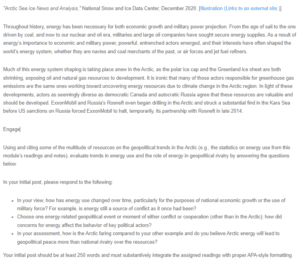Discussion – Energy Rivalry
Evolution of Energy Usage
Energy usage over the past 50 years shows that there is still a high dependency on fossil fuels. Besides, the types of fossil fuels being consumed have evolved with time. There has been a transition from solid fuels (coal) to liquids (oil) and finally to gas (natural gas) (Barnett, 2007). Coal and oil fuels have witnessed a significant decline in their usage, and natural gas usage has risen. Subsequently, the energy consumption type has shifted the economic and military relations between countries.
Fossil fuel dependency continues to fuel global conflicts to date. Some regions experiencing active conflict resulting from fossil fuel dependency include South Sudan, Ukraine/Crimea, Iraq/Syria, and the South China Sea. Although these conflicts are unique with varying causative factors, they are tied to the fixation of nations with energy. The national, religious, and ethnic antagonism witnessed results from a fight over control of oil and gas.
Energy Conflict
The Russia-Ukraine conflict is a notable conflict emanating from the fight to control energy resources. Since 2010, Ukraine has sought to reduce its energy dependency on Russia. In 2011, Ukraine’s imports of Russian oil stood at 45 bcm, but it had declined to 28 bcm in 2013 (NATO, 2014). Ukraine’s initial desire was to avoid Russian oil imports entirely by 2020. Noting that Ukraine was pursuing energy independence, Putin’s administration annexed the Crimean Peninsula, effectively denying Ukraine up to 13 billion bcm of natural gas.
Arctic Region
The Arctic region is considered to have unexploited renewable and non-renewable energy sources. The area has about 4 million people, and it is characterized by harsh climatic conditions that include a long winter (Valfells, 2019). That means that energy is vital for the survival of people who live in the region. Arctic countries can utilize modern technology to exploit the available renewable energy sources. Canada and Greenland acquire much of their electricity from renewable sources, but there is still room for improvement. The US can also collaborate with partners like Canada to create more clean energy for its people.
References
Barnett, J. (2007). The Geopolitics of Climate Change. Geography Compass, 1(6), 1361–1375. https://doi.org/10.1111/j.1749-8198.2007.00066.x
NATO. (2014, May 27). The energy dimensions of Russia’s annexation of Crimea. NATO Review. https://www.nato.int/docu/review/articles/2014/05/27/the-energy-dimensions-of-russias-annexation-of-crimea/index.html
Valfells, M. de W., Hlynur Stefánsson & Ágúst. (2019). Energy security in the Arctic: Policies and technologies for integration of renewable energy. Arcticyearbook.com. https://arcticyearbook.com/arctic-yearbook/2019/2019-briefing-notes/329-energy-security-in-the-arctic-policies-and-technologies-for-integration-of-renewable-energy
ORDER A PLAGIARISM-FREE PAPER HERE
We’ll write everything from scratch
Question

Discussion – Energy Rivalry
“Arctic Sea Ice News and Analysis,” National Snow and Ice Data Center, December 2020. [Illustration (Links to an external site.)]
Throughout history, energy has been necessary for both economic growth and military power projection. From the age of sail to the one driven by coal, and now to our nuclear and oil era, militaries and large oil companies have sought secure energy supplies. As a result of energy’s importance to economic and military power, powerful, entrenched actors emerged, and their interests have often shaped the world’s energy system, whether they are navies and coal merchants of the past, or air forces and jet fuel refiners.
Much of this energy system shaping is taking place anew in the Arctic, as the polar ice cap and the Greenland ice sheet are both shrinking, exposing oil and natural gas resources to development. It is ironic that many of those actors responsible for greenhouse gas emissions are the same ones working toward uncovering energy resources due to climate change in the Arctic region. In light of these developments, actors as seemingly diverse as democratic Canada and autocratic Russia agree that these resources are valuable and should be developed. ExxonMobil and Russia’s Rosneft even began drilling in the Arctic and struck a substantial find in the Kara Sea before US sanctions on Russia forced ExxonMobil to halt, temporarily, its partnership with Rosneft in late 2014.
Engage
Using and citing some of the multitude of resources on the geopolitical trends in the Arctic (e.g., the statistics on energy use from this module’s readings and notes), evaluate trends in energy use and the role of energy in geopolitical rivalry by answering the questions below.
In your initial post, please respond to the following:
- In your view, how has energy use changed over time, particularly for the purposes of national economic growth or the use of military force? For example, is energy still a source of conflict as it once had been?
- Choose one energy-related geopolitical event or moment of either conflict or cooperation (other than in the Arctic); how did concerns for energy affect the behavior of key political actors?
- In your assessment, how is the Arctic faring compared to your other example and do you believe Arctic energy will lead to geopolitical peace more than national rivalry over the resources?
Your initial post should be at least 250 words and must substantively integrate the assigned readings with proper APA-style formatting

